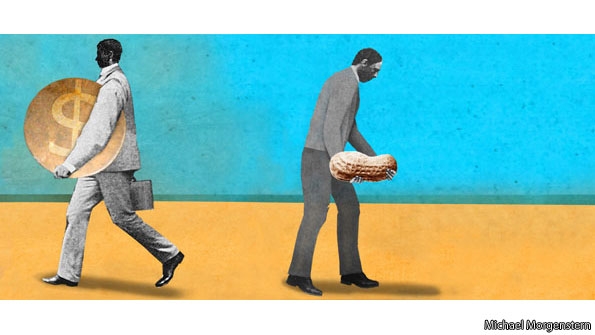< < Go Back
A dramatic concentration of incomes over the past 30 years, on a scale that matches, or even exceeds, the first Gilded Age. Including capital gains, the share of national income going to the richest 1% of Americans has doubled since 1980, from 10% to 20%, roughly where it was a century ago.
This is an extraordinary development, and it is not confined to America. Many countries, including Britain, Canada, China, India and even egalitarian Sweden, have seen a rise in the share of national income taken by the top 1%.
That does not mean the world as a whole has become more unequal. Global inequality—the income gaps between all people on the planet—has begun to fall as poorer countries catch up with richer ones.
Many economists, too, now worry that widening income disparities may have damaging side-effects. In theory, inequality has an ambiguous relationship with prosperity. It can boost growth, because richer folk save and invest more and because people work harder in response to incentives. But big income gaps can also be inefficient, because they can bar talented poor people from access to education or feed resentment that results in growth-destroying populist policies. The mainstream consensus has long been that a growing economy raises all boats, to much better effect than incentive-dulling redistribution.
In all sections of society, there is growing agreement that the world is becoming more unequal, and that today’s disparities and their likely trajectory are dangerous.
That is too simplistic. Inequality, as measured by Gini coefficients, is simply a snapshot of outcomes. It does not tell you why those gaps have opened up or what the trend is over time. And like any snapshot, the picture can be misleading.
Based on this evidence it will make three arguments. First, although the modern global economy is leading to wider gaps between the more and the less educated, a big driver of today’s income distributions is government policy.
Second, a lot of today’s inequality is inefficient, particularly in the most unequal countries. It reflects market and government failures that also reduce growth. And where this is happening, bigger income gaps themselves are likely to reduce both social mobility and future prosperity.
Third, there is a reform agenda to reduce income disparities that makes sense whatever your attitude towards fairness. It is not about higher taxes and more handouts. Both in rich and emerging economies, it is about attacking cronyism and investing in the young. You could call it a “True Progressivism”.
Compete, target and reform.
Such cross-dressing is a sign of change, but politicians have a long way to go. The right’s instinct is too often to make government smaller, rather than better. The supposedly egalitarian left’s failure is more fundamental. Across the rich world, welfare states are running out of money, growth is slowing and inequality is rising—and yet the left’s only answer is higher tax rates on wealth-creators. Messrs Obama, Miliband and Hollande need to come up with something that promises both fairness and progress. Otherwise, everyone will pay.




